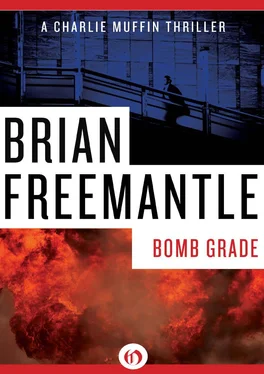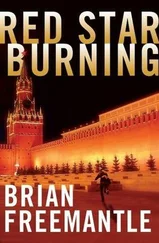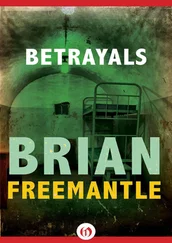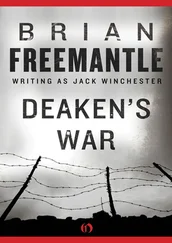Brian Freemantle - Bomb Grade
Здесь есть возможность читать онлайн «Brian Freemantle - Bomb Grade» весь текст электронной книги совершенно бесплатно (целиком полную версию без сокращений). В некоторых случаях можно слушать аудио, скачать через торрент в формате fb2 и присутствует краткое содержание. Жанр: Шпионский детектив, на английском языке. Описание произведения, (предисловие) а так же отзывы посетителей доступны на портале библиотеки ЛибКат.
- Название:Bomb Grade
- Автор:
- Жанр:
- Год:неизвестен
- ISBN:нет данных
- Рейтинг книги:4 / 5. Голосов: 1
-
Избранное:Добавить в избранное
- Отзывы:
-
Ваша оценка:
- 80
- 1
- 2
- 3
- 4
- 5
Bomb Grade: краткое содержание, описание и аннотация
Предлагаем к чтению аннотацию, описание, краткое содержание или предисловие (зависит от того, что написал сам автор книги «Bomb Grade»). Если вы не нашли необходимую информацию о книге — напишите в комментариях, мы постараемся отыскать её.
Bomb Grade — читать онлайн бесплатно полную книгу (весь текст) целиком
Ниже представлен текст книги, разбитый по страницам. Система сохранения места последней прочитанной страницы, позволяет с удобством читать онлайн бесплатно книгу «Bomb Grade», без необходимости каждый раз заново искать на чём Вы остановились. Поставьте закладку, и сможете в любой момент перейти на страницу, на которой закончили чтение.
Интервал:
Закладка:
Push it as far as you can when you’re on a roll, Charlie told himself. ‘Crime makes Moscow astronomically expensive. My cost of living allowance will need to be proportionately substantial. Considerably more than might normally be accepted, even in the high-cost diplomatic postings like Tokyo or Washington. And the justifiable out-of-pocket expenses will undoubtedly be larger as well. I’m going to have to go where the Mafias go… clubs… restaurants…’ Charlie was close to enjoying himself: certainly he was enjoying Gerald Williams’ obvious anguish.
‘I don’t think all this needs to be discussed today,’ attempted the accountant, blinking nervously at the prospects for gain Charlie was working to establish.
‘I think it’s important to discuss and agree everything here today that might affect the success of what I have to do,’ said Charlie, equally anxious.
Charlie was aware of the Director-General momentarily regarding him with what could have been a bemused smile. Then the man turned to Williams and said, ‘I think things should be put on the highest scale. This is a new role that has to succeed, to stop the political sniping that the country doesn’t need intelligence services any more. So I don’t want anything endangered by penny-pinching.’
‘I am to liaise with the Russians and whatever the FBI arrangement is there?’ Charlie hurried on.
‘Yes.’ Dean resumed charge of the conversation.
‘They know we’re sending someone over specifically for the purpose?’
‘Yes.’
‘Just someone? Or has my name been put forward, for approval?’
‘To the Russians, yes: more formal and official arrangements obviously had to be made with Moscow. With the Americans everything was left open, until today’s meeting.’ The Director-General paused. ‘Is there a problem?’
If Natalia had transferred at the rank she’d occupied in the former KGB it was possible she’d even know he was coming! Nodding yet again towards his dossier, Charlie said, ‘There will be an extensive file on me, both in Washington and Moscow.’
‘The KGB is defunct. And their records, too. There obviously hasn’t been the slightest association with what you once were and what you once did.’
‘I don’t think I’m particularly popular in America, either.’
‘What you did, you did to the CIA, not the FBI. Each hates the other. The Bureau would probably approve, not criticize: find it amusing, even. And it’s very ancient history, anyway,’ dismissed the Director-General, showing how extensively he, and therefore everyone else in the room, had studied Charlie’s file.
‘Your sole primary concern is not making mistakes,’ warned Johnson.
‘I won’t,’ promised Charlie, carelessly.
‘No more than once,’ said Pacey. ‘I’ve already told you that.’
‘I like him,’ judged the Director-General. It was a remark addressed more to his deputy than anyone else: Charlie Muffin had been Peter Johnson’s recommendation.
‘He’s a liar and a thief,’ insisted the financial controller, seething at Charlie’s easy success with allowances and accommodation.
‘Isn’t that why he’s being sent: poacher turned gamekeeper?’ reminded the cadaverous deputy.
‘There are others who could have gone, without the uncertainties that always surround this man,’ argued Williams.
‘Costing as much as possible is all part of the budgetary exercises,’ said Johnson, defending his choice. ‘We’ve not only to establish a new role for ourselves. We’ve got to establish a financial ceiling. The more we spend in expansion, the more important and necessary we’ll appear.’
‘That’s cynical reasoning,’ reproached Williams.
‘Practical reasoning,’ corrected Johnson, equally insistent. ‘I want to build a new empire, not destroy one.’
I want, isolated Dean. He didn’t want to confront the other man so soon but he had the worrying impression that Johnson’s annoyance at not getting the directorship might become a problem. Maybe it hadn’t been as wise as he’d thought to accept Johnson’s suggestion about the Moscow posting: it could have made Johnson imagine an unnecessary reliance. ‘ We want to build a new empire.’
‘Muffin’s not the man to do it,’ insisted Williams.
‘We’re not relying on him doing it alone,’ reminded the Director-General.
‘I’ll tell Fenby: he was very helpful,’ said Johnson. John Fenby was the FBI Director. It had been Johnson’s idea, too, to seek the political support of the Americans through govemment-to-government pressure for a specific British posting to Moscow to match their own.
‘Is it really necessary to tell Fenby?’ asked the Director-General.
‘We’re becoming more like the FBI: we’ll need a close working relationship,’ Johnson pointed out.
‘You will keep me informed at every stage, won’t you?’
‘I don’t think I need to be reminded to do that.’
This was becoming petulant, decided Dean. Which was ridiculous. Ending it by looking away from his deputy to include everyone else, he said, ‘We’ve made an important decision today. Let’s do all we can from this end to make sure it works.’
Peter Johnson’s first act upon returning to his own office was to call Washington.
Stanislav Silin wasn’t any longer accustomed to doing things for himself. He’d forgotten how to, like he’d forgotten his own stepping stones to power. When Stanislav Silin wanted something done, anything done, he told someone to do it and if the task wasn’t performed to his total satisfaction then those who failed were punished. But not this time or this way. For this meeting and for this meeting place he couldn’t trust anyone inside the Dolgoprudnaya, not even Petr Markov, and most certainly not outside. Apart, that is, from Marina. No man had been as lucky as he had with a wife like her. The hatred boiled up at the threat Sobelov had created. Soon, he told himself, soon he’d make the man sorry. But there were other things first. He’d had to find this very special apartment himself and arrange the lease himself and for the first time in almost fifteen years he hadn’t been able to intimidate the landlord with the inference of who he was for fear the man might sell him out or be under threat from a higher or initially more feared bidder. Which was an irony Silin could appreciate, inconvenient though it had been: he’d even been amused when the landlord had tried to intimidate him with warnings of the consequences of his being a bad tenant.
Silin had specifically chosen the Ulitza Razina, in the oldest Kitay-Gorod district, because all the pre-revolutionary buildings, some actually minor palaces, had under communism been turned into apartment rabbit warrens with a warren’s benefit of many different entrances, several from two streets quite separate from the Razina courtyard. Its most important advantage was the personal protection it gave him from Sobelov but it equally protected the people he was meeting that afternoon and upon whom not just his survival but an unimaginable business future depended. Like he could – and would – they could also arrive separately and leave separately and never use the same door or courtyard twice, making discovery or identification totally impossible.
The apartment was bare-board basic, of course, which he regretted. His two city mansions and the dacha in the outer hills were designer-decorated, the marble shipped from Italy, the wall and upholstery silk specially woven before being flown in from Hong Kong: the opulence awed people, giving him an advantage. For this operation, anonymity and secrecy were the only advantages he sought. His single addition was the bottles and glasses set out on the matchwood sideboard: he hadn’t even bothered to cover the bed in the adjoining room.
Читать дальшеИнтервал:
Закладка:
Похожие книги на «Bomb Grade»
Представляем Вашему вниманию похожие книги на «Bomb Grade» списком для выбора. Мы отобрали схожую по названию и смыслу литературу в надежде предоставить читателям больше вариантов отыскать новые, интересные, ещё непрочитанные произведения.
Обсуждение, отзывы о книге «Bomb Grade» и просто собственные мнения читателей. Оставьте ваши комментарии, напишите, что Вы думаете о произведении, его смысле или главных героях. Укажите что конкретно понравилось, а что нет, и почему Вы так считаете.












